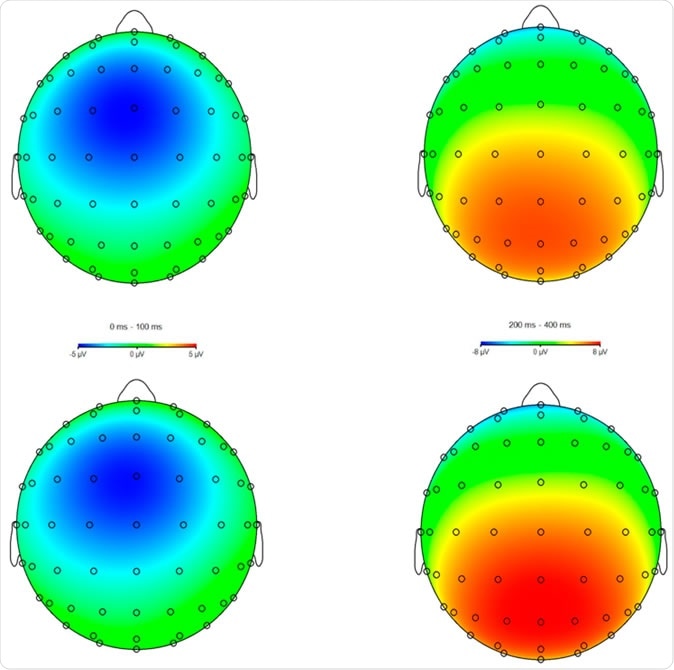Researchers at the department of Psychology, Michigan State University have studied the neurocognitive mechanisms related to mindfulness. Their study analyzed the correlation between mindfulness and error monitoring.
The results showing divergent outcomes that reveal the unclear nature of such relationship. Furthermore, the research also addresses the issues related to heterogeneity while mindfulness training under progress. The research is published in the journal of Brain Sciences.

Scalp voltage maps for the error-minus-correct error-related negativity (ERN, left) and error positivity (Pe, right) as a function of group (control, top; meditation, bottom).
The impact of open monitoring (OM) meditation was examined on neural [error positivity (Pe), error-related negativity (ERN)] and behavioral indices in a large non-meditating samples. Results showed the enhancement of Pe amplitude in comparison to active controls, however the ERN or behavioral performance did not changed, this might be due to technical variation while mindfulness training.
Variation in the scope and object of awareness while mindfulness training may act differentially to modulate the error monitoring. The impact of technical variation is evident from the extent of distinction between focused attention (FA) and open monitoring (OM) meditation. Substantial variation in mindfulness practices brings different outcomes. This can be best explained by critically examining difference between focused attention (FA) and open monitoring (OM) meditation - two separate meditative practices of “mindfulness meditation”.
As explained by MSU psychology doctoral candidate and study co-author Yanli Lin, "FA meditation is conceptualized as the voluntary direction of sustained attentional awareness to a target object (e.g., the breath), whereas OM meditation involves non-judgmental monitoring of momentary experience without explicit direction to attend to a preselected target. Importantly, FA and OM meditation have shown unique patterns of neural activation and differentially effect on cognitive and active processes". This functional difference between two different mindfulness practices (OM and FA) create difference in results also.
The finding suggested the different neurocognitive effects originated with different forms of meditation. Lin explained that there is very little research about how open monitoring meditation alters error recognition. OM meditation recruit various neural processes which are related to conscious error detection, and selective training of these various overlapping neural substrates while OM meditation may bring larger Pe. The other factors which bring change in results are training duration and sample experience.
For the past few decades, mindfulness, has gained more attention due to its innumerable benefits, covering broad areas including public health, corporations, academia, and even politics. Number of studies reporting the effect of mindfulness but its underlying mechanisms explaining, how it works was not much explored. However, the present study explains it very well.
According to the study some meditation practices only focus on a single object, mainly your breath, however open monitoring meditation is different. It has give attention to everything moving in mind and body.
Lin with his co-workers at MSU tested how open monitoring meditation makes an impact on individual and how people respond to errors, by choosing sample size more than 200. Brain activity was also measured through electroencephalography, or EEG. Results showed that 20 min meditation gives rise to a lot of positive change. The strength of signal related to error positivity was found to increase in the meditators with respect to the controls.
Overall, this is an interesting finding, which very strongly illustrates the positive impact of meditation on brain’s activity. Just 20 minutes of meditation leads to enhancement of the brain's capability to detect and focus on mistakes.
Journal reference:
On Variation in Mindfulness Training: A Multimodal Study of Brief Open Monitoring Meditation on Error Monitoring, Yanli Lin, William D. Eckerle, Ling W. Peng and Jason S. Moser, Department of Psychology, Michigan State University, Brain Sci. 2019, 9(9), 226; https://doi.org/10.3390/brainsci9090226, https://www.mdpi.com/2076-3425/9/9/226/htm